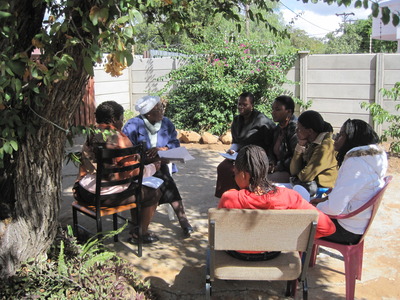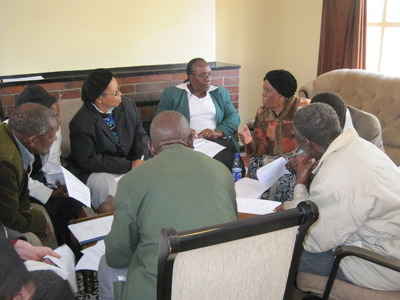Learn about the Diocese of Botswana

Knowing about Botswana and about its culture and heritage is an important step in building a relationship with our companion link, the Diocese of Botswana.
One obvious source is found among us here in the Diocese of North Carolina: Those who have visited the Diocese of Botswana and served as companions in other ways. That doesn’t make them experts, but it does enable them to share their experiences and encourage you to enter into relationship with our companion diocese. Contact us to arrange for a program.
On this webpage we provide a variety of sources – websites and other sources – to help you gain knowledge about Botswana and our companion diocese:
- Botswana's culture, heritage and present realities
- African Christianity and the Church in Botswana
- The theology of companionship and partnership in the Anglican Communion
BOTSWANA'S CULTURE, HERITAGE AND PRESENT REALITIES
There are a number of sources that provide brief information about Botswana. Some of the best that we have found are these:
- The BBC provides a good “Botswana Profile,” which includes an historical timeline and a page on Botswana’s leaders.
- Infoplease includes an additional page about HIV/AIDS in Botswana.
- National Geographic provides not only basic facts but also maps, a video and a good dose of its superb photography.
The U.S. government provides some information on Botswana on its websites. The State Department’s main contribution is information about U.S.-Botswana relations. At the bottom of the page are links to U.S. government reports on such subjects as human rights, religious freedom, human trafficking, and American aid, which will contain sections on Botswana (mostly very positive). Not surprisingly, the CIA gives a lot of matter-of-fact hard data.
The Government of Botswana has a webpage, but it is designed to deal broadly with the details of governance rather than give a handy summary of information.
Michael Main has written Botswana - Culture Smart!: a quick guide to customs & etiquette (2007), an excellent resource to guide those visiting Botswana in navigating a different culture.

To get a flavor of Botswana’s day-to-day life, taking a glance at local newspapers can be interesting. There is no single paper that stands out above the others. Here are some choices:
The handiest way to do this is to go to an online newspapers website that lists Botswana papers, and click on the one you want to see. Papers that might appeal are Mmegi/Monitor, The Voice, Botswana Guardian, and Sunday Standard. Few are dailies, and the weeklies come out on different days of the week. The BBC site mentioned above also lists Botswana media with links.
Covering the continent is AllAfrica.com, but it has a Botswana page listing recent articles.
Another source of “flavor” about Batswana life is The No 1 Ladies' Detective Agency book series written by Alexander McCall Smith. It is set in Gaborone and tells the story of Precious Ramotswe’s detective adventures. The picture it gives of Batswana life is perhaps a dying one, but the stories are charming. The books often refer to Bishop Trevor Mwamba, and the films released in 2008 actually included a role for him. He plays a priest. The President Hotel, in the city center, now has a Mma Ramotswe Tea Room.
Website postings about Botswana’s history are rather sketchy and sometimes inaccurate, and turning to a limited list of books may be wise. Here are a few suggestions. Unfortunately, some are rather dated.
- Thomas Tlou's book History of Botswana, written with Alec Campbell in 1984 with a second edition in 1997, is one of the few national histories available. And sadly, it is difficult to find, but give it a try and let us know!
- Fred Morton and Jeff Ramsay edited The Birth of Botswana: The History of the Bechuanaland Protectorate from 1910 to 1966 (1987). This book has been used as a secondary school and undergraduate textbook, but it is not simplistic.
- Fred Morton, Jeff Ramsey, and Thema Mgadla also produced the Historical Dictionary of Botswana (2008), a valuable but expensive resource.
- Online, Neil Parsons, like Fred Morton a professor of history at the University of Botswana, put together something he calls “Botswana History Pages” with a number of sections, from a brief history to culture, economy, religion and so on. The site isn’t fancy, but it is sound. There is also an extensive bibliography and a critique of Botswana-oriented websites (as of around 2000).
AFRICAN CHRISTIANITY AND THE CHURCH IN BOTSWANA
There is a lot about Christianity in Africa on the internet, but nothing stands out to which we wish to draw your attention. If you find especially helpful sites, let us know!
In the midst of a wide literature about particular aspects of African Christianity, several exceptional histories of the Church in Africa deserve mention.
- John Baur’s 2000 Years of Christianity in Africa (1994) is a thorough study strong on Roman Catholic developments and good but not always accurate about Protestants.
- Adrian Hastings has written a fine insightful two-volume work: A History of African Christianity 1950-1975 (1979) and The Church in Africa 1450-1950 (1994).
- Elizabeth Isichei has written a very readable A History of Christianity in Africa (1995).
- Bengt Sundkler and Christopher Steed’s A History of the Church in Africa (2000) is a monumental, brilliant work that may overwhelm readers with detail.
The Rev. James Amanze, who chairs Botswana’s companion link committee, is professor of theology at the University of Botswana. He has been prolific in his writings about the Church. Notable works include African Christianity in Botswana: The Case of African Independent Churches (1994); African Traditional Religions and Culture in Botswana (2002); Biblical Studies, Theology, Religion, and Philosophy: An Introduction for African Universities (2010); Botswana Handbook of Churches (1994); Ecumenism in Botswana: The Story of the Botswana Christian Council, 1964-2004 (2006); and A history of the ecumenical movement in Africa (1999).
One way to get a flavor of life in the Church in Botswana is through the eyes of a North Carolinian. The Rev. Leon Spencer, who from 2010 has spent a year in Botswana, wrote a “Botswana Diary” reflecting upon his experiences while teaching at the St. Augustine Theological School in Gaborone.
THE THEOLOGY OF COMPANIONSHIP AND PARTNERSHIP IN THE ANGLICAN COMMUNION
Companion links are meant to be relational, and the nature of the relationship is often addressed with the word partnership and the phrase mutual responsibility and interdependence. The phrase comes from the Anglican Congress held in Toronto in 1963. The “younger churches” in the Global South were securing their own independence from the historic mission societies, and questions were naturally being raised about a new relationship between the Western and non-Western, especially African, churches. The vision that emerged from Toronto became a profound challenge to the old way of doing things. Key was the phrase, “mutual responsibility and interdependence.” The text of the Congress’ own document is available online.

Companion dioceses really emerged from this struggle to be a global communion characterized by respect and accountability to one another. One way to give meaning to the visionary words was a valuable document called the "Ten Principles of Partnership in the Anglican Communion” (1993). The “Five Marks of Mission” (1984, 1990) is also a document seeking to ensure that our relationships are firmly rooted in a vision of Christian mission.
Several years ago the Diocese of North Carolina’s School of Ministry produced a DVD series called “Conversations about a theology of partnership.” It included interviews with the bishops of North Carolina, Botswana and Costa Rica along with clergy and laity engaged in global mission. There were four sections that work well as a series for a parish adult forum: “Working together toward Jesus’ dream,” speaking generally about partnership among dioceses around the Anglican Communion; “The Ten Principles of Partnership,” discussing the document mentioned above; “Partnership and the Millennium Development Goals,” considering the relevance of a theology of partnership to the MDGs; and “Partnership Challenges,” the title defining the topic. This DVD resource may prove valuable for any parish engaging in global mission and companion links. There is a study guide. If interested, contact Leon Spencer.
For those interested in the emergence of global Anglicanism and the relationships that led to companion links, several important books have been published in recent decades:
- Ian Douglas and Kwok Pui-lan, eds., Beyond Colonial Anglicanism (2001). See especially Ian Douglas’ “The Exigency of Times and Occasions: Power and Identity in the Anglican Communion Today.”
- Ian Markham and others, The Wiley-Blackwell Companion to the Anglican Communion (2013). Note especially Grant LeMarquand’s “Globalization of the Anglican Communion.”
- Kevin Ward, A History of Global Anglicanism (2006)
- Andrew Wingate, et.al., eds., Anglicanism: A Global Communion (1998). In particular, see Kevin Ward’s brief “The development of Anglicanism as a global communion,” in this volume, but note that his perspectives predated the recent controversies.
We hope you enjoy learning more about our companion link. Let us know of resources which you find especially helpful.
